Retirement Scouting: Exploring Punta Cana for a Potential Second Home
Why Choose Punta Cana for Retirement
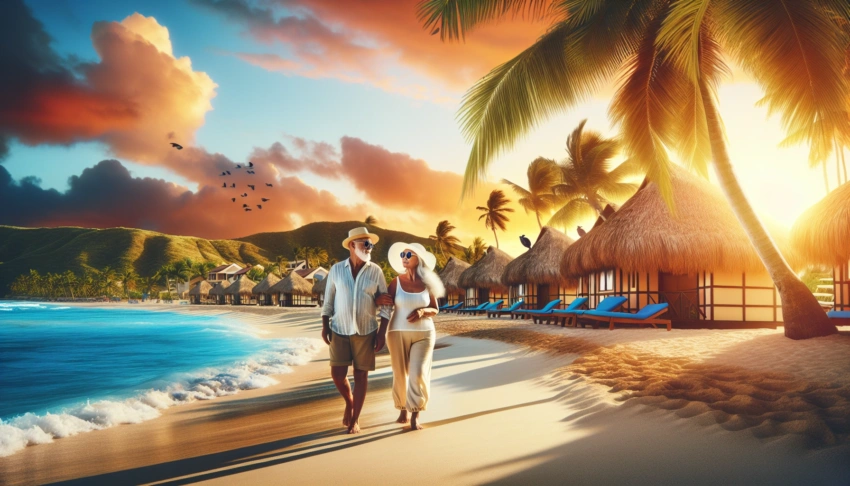
Retirement Scouting: Exploring Punta Cana for a Potential Second Home
Retirement is the time to savor life’s pleasures, and choosing the perfect location for your second home can make all the difference. Punta Cana, with its stunning beaches and vibrant lifestyle, has become a preferred destination for retirees searching for a paradise to call their own.
1. Climate and Weather
Punta Cana is renowned for its idyllic tropical climate, offering warm temperatures and sunshine all year round. This consistent weather pattern makes it an attractive destination for retirees seeking to escape harsh winters. The average temperature hovers around 77°F to 82°F (25°C to 28°C), allowing for a multitude of outdoor activities throughout the year.
The region experiences two main seasons: the wet season, from May to October, and the dry season, from November to April. Despite the occasional rainfall during the wet season, showers are typically short-lived, providing a lush landscape without significant disruption to daily life. The gentle breezes from the Atlantic Ocean help keep humidity levels comfortable, ensuring a pleasant living environment. This climate fosters a healthy, active lifestyle, ideal for retirees who enjoy outdoor pursuits such as golfing, swimming, and walking on the pristine beaches.
2. Cost of Living
One of the most compelling reasons to choose Punta Cana for retirement is its affordable cost of living. Compared to other popular retirement destinations, Punta Cana offers significant savings on everyday expenses. Housing costs, in particular, are considerably lower, with a wide range of options available from beachfront condos to quaint villas.
Cost of Living Comparison
| Category | Punta Cana | Florida, USA | Spain |
|---|---|---|---|
| Rent (1-bedroom apartment) | $500 – $800 | $1,200 – $1,800 | $700 – $1,000 |
| Groceries (monthly) | $200 | $300 | $250 |
| Healthcare (monthly) | $100 | $500 | $150 |
Punta Cana’s affordability extends beyond housing. Groceries, dining out, and healthcare services are all reasonably priced, allowing retirees to enjoy a comfortable lifestyle without the financial strain often associated with retirement in other locales. This affordability provides retirees the opportunity to allocate more resources to leisure activities and travel, enhancing their overall quality of life.
3. Cultural and Recreational Activities
Punta Cana is not just about picturesque beaches; it also boasts a vibrant cultural scene that enriches the lives of its residents. The region offers an array of cultural and recreational activities that cater to diverse interests, ensuring that retirees can find something to engage with regardless of their hobbies or passions.
From the lively merengue and bachata music to the colorful local festivals, there is always something happening in Punta Cana. Retirees can immerse themselves in the local culture by participating in dance classes, attending art exhibitions, or exploring the numerous historical sites in the area. For those who enjoy more leisurely pursuits, Punta Cana offers world-class golf courses, stunning nature trails, and pristine beaches perfect for relaxation.
The area’s thriving expat community further enhances the cultural landscape, offering a blend of cuisines, languages, and traditions. This cultural diversity fosters a welcoming environment for retirees from all over the world, making it easy for newcomers to integrate and feel at home.
In conclusion, Punta Cana offers retirees an appealing combination of beautiful weather, affordable living, and a rich cultural tapestry. These factors combine to create an ideal setting for those seeking a second home that promises both relaxation and adventure. Whether you’re drawn by the climate, the cost savings, or the cultural opportunities, Punta Cana stands out as a prime choice for retirement.
Real Estate Market in Punta Cana
As more retirees look to invest in a second home, Punta Cana emerges as an appealing option. Understanding the intricacies of the real estate market here can help ensure a successful and rewarding purchase.
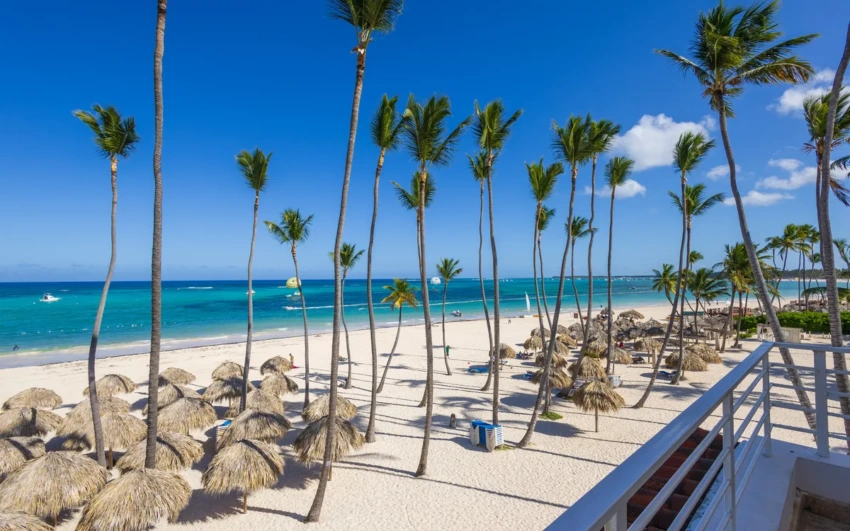
Punta Cana
1. Types of Properties Available
Punta Cana offers a diverse array of property types that cater to different preferences and budgets. Whether you are drawn to the allure of the ocean or the tranquility of a gated community, there’s something for everyone.
Variety of Properties in Punta Cana
| Property Type | Location | Price Range | Features |
|---|---|---|---|
| Beachfront Condos | Bavaro, Cap Cana | $200,000 – $600,000 | Ocean views, modern amenities |
| Gated Community Villas | Punta Cana Village, Cocotal | $300,000 – $1,000,000 | Security, private pools |
| Luxury Estates | Cap Cana, Punta Cana Resort | $1,000,000+ | High-end finishes, expansive grounds |
Beachfront condos are particularly popular, offering stunning ocean views and direct access to pristine beaches. For those seeking privacy and exclusivity, gated community villas provide a serene environment with added security. Luxury estates cater to those desiring opulence, complete with high-end finishes and expansive grounds.
2. Navigating the Buying Process
The process of purchasing property in Punta Cana involves several legal and financial steps that can be navigated smoothly with proper guidance. It’s essential to understand the local real estate laws and enlist professional assistance to ensure a seamless transaction.
- Engage a Reputable Real Estate Agent: A local agent can provide invaluable insights into the market and help identify suitable properties.
- Legal Assistance: Hiring a lawyer familiar with Dominican real estate law is crucial to navigate contracts and ensure compliance with local regulations.
- Financial Considerations: Understanding the costs involved, including taxes and fees, will help in budgeting effectively.
- Title Verification: Conduct thorough due diligence to verify the property’s title and any encumbrances.
- Contract Signing and Payment: Once satisfied, proceed with signing the purchase agreement and making the necessary payments.
The assistance of a reputable real estate agent and a knowledgeable lawyer can make a substantial difference in the buying experience, ensuring that all legalities are respected and the transaction is transparent.
3. Investment Potential
Punta Cana’s real estate market is not only attractive for personal use but also holds significant investment potential. Understanding the trends and opportunities can enhance the value of your purchase.
Punta Cana has seen consistent growth in tourism, which directly impacts the real estate market. Properties here have the potential for lucrative rental income, especially during peak tourist seasons. Moreover, the region’s continued development and infrastructure improvements contribute positively to property appreciation rates.
When evaluating investment potential, consider factors such as location desirability, proximity to amenities, and historical price trends. Properties in high-demand areas like Bavaro and Cap Cana tend to offer higher returns due to their popularity among tourists and expatriates alike.
The real estate market in Punta Cana presents a dynamic landscape, offering opportunities for both personal enjoyment and financial gain. By understanding the types of properties available, navigating the buying process with professional help, and assessing investment potential, retirees can make informed decisions about purchasing a second home in this paradise.
Living in Punta Cana: Everyday Life
Punta Cana offers a serene yet vibrant everyday life for retirees seeking a second home. It’s a place where the gentle hum of the ocean meets the warm embrace of a welcoming community, and where modern conveniences coexist with the charm of island living.
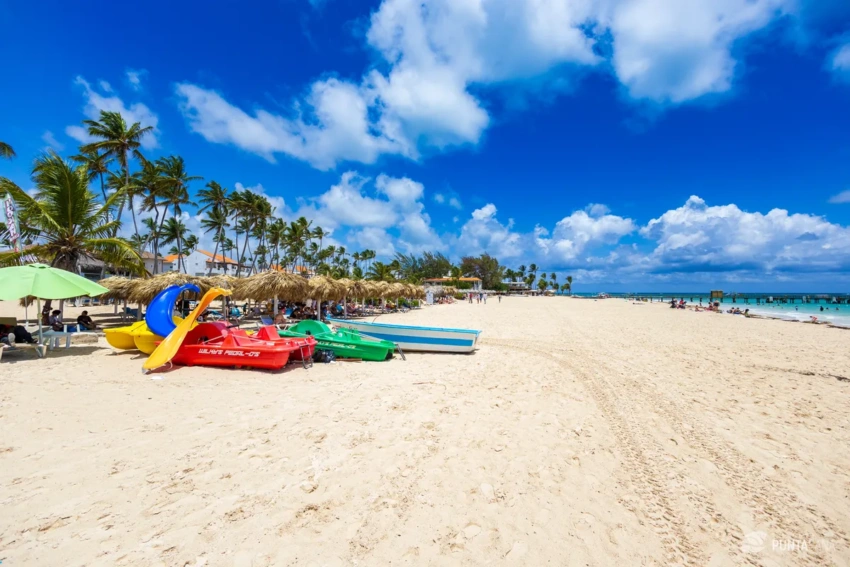
Punta Cana
1. Healthcare Facilities
Punta Cana’s healthcare infrastructure has witnessed significant advancements, making it a reliable destination for retirees concerned about medical services. The region hosts a range of healthcare facilities, from modern private clinics to specialized hospitals that cater to both locals and expatriates. Notable institutions include the Hospiten Bavaro, which offers comprehensive services, including emergency care, specialized treatments, and diagnostic imaging.
It’s crucial for retirees to ensure their healthcare needs are met while living abroad. Punta Cana offers a balance of quality and accessibility, with most facilities staffed by bilingual professionals, providing peace of mind for English-speaking residents.
- Private Health Insurance: This is advisable for expatriates, covering a wide array of services and reducing out-of-pocket expenses.
- Preventive Care: Regular health check-ups are encouraged, with many facilities offering packages tailored to retirees.
The provided information is for informational purposes only and may not be up-to-date. Please verify with official sources before using it.
2. Community and Social Life
Living in Punta Cana means becoming part of a vibrant community that celebrates both its Dominican roots and a diverse expatriate population. The social fabric here is woven with opportunities for interaction, from local clubs and community groups to cultural events and volunteer activities.
- Community Centers: These serve as hubs for social activities, workshops, and classes, fostering connections among residents.
- Expat Groups: Joining expat communities can ease the transition and provide support, whether through social gatherings or practical advice.
For those looking to integrate more deeply, engaging in local traditions and participating in community events can enrich the experience of living in Punta Cana.
3. Transportation and Accessibility
Punta Cana boasts a well-developed transportation network that facilitates easy exploration of both the local area and the broader Dominican Republic. The Punta Cana International Airport is a pivotal gateway, offering direct flights to numerous international destinations, a boon for retirees who travel frequently.
Local transportation options are diverse, including taxis, private car hires, and public buses. Car rentals are also a popular choice for those who prefer the freedom of driving. The road infrastructure is generally well-maintained, providing accessibility to various attractions and amenities.
Transportation Options in Punta Cana
| Option | Details | Availability |
|---|---|---|
| Public Buses | Cost-effective and cover major routes | High |
| Taxis | Convenient for short distances | High |
| Car Rentals | Ideal for personal travel flexibility | Moderate |
Understanding the transportation landscape is key for retirees to navigate life seamlessly in Punta Cana. The combination of local and international connectivity makes it a strategically desirable location for those considering relocation.
Our Best Ocean View Villa Rentals in Punta Cana
If the idea of settling in Punta Cana sounds appealing, you’ll find a variety of exquisite villas that beckon with their promise of comfort and stunning ocean views. These properties are designed to cater to your desires for a serene retirement life.

Brand-New Oceanfront Luxury Cap Cana 10BR Villa - Private Beach, Full Staff, Home Theater
from $8648 night Read more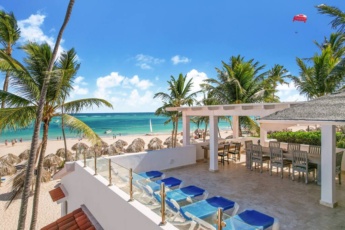
New Bávaro Beach Beachfront Condo for Rent - Stunning Ocean View, Housekeeper & Rooftop Terrace
from $811 night Read morePractical Considerations for Retirees
Making the decision to retire in a foreign country involves meticulous planning and understanding of various logistical details. Punta Cana, with its alluring beaches and relaxed lifestyle, is no exception. As you ponder relocating to this vibrant destination, it’s important to be informed about the practical considerations that will affect your day-to-day life.
1. Visa and Residency Requirements
To enjoy a seamless transition to living in Punta Cana, understanding the visa and residency requirements of the Dominican Republic is crucial. Retirees typically apply for a pensionado visa, which is designed for those receiving a stable pension income.
- To qualify, you must provide proof of a monthly income of at least $1,500 from a pension or retirement fund.
- The application process involves submitting various documents, including a medical certificate, police clearance, and proof of income.
- Once approved, the pensionado visa allows for multiple entries and exits, providing the flexibility many retirees desire.
Consider consulting with a legal advisor specializing in Dominican immigration law to ensure a smooth application process. This will help you avoid potential pitfalls and ensure all paperwork is in order.
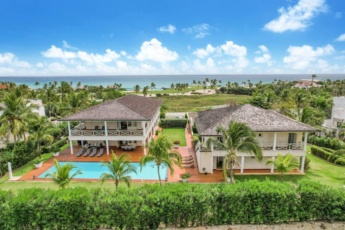
Private Cap Cana Caleton Villa with Large Pool, Ocean View, and Top Amenities
from $2246 night Read more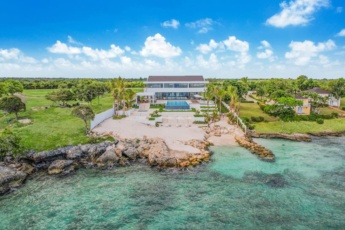
New & Luxury Casa de Campo Oceanfront Villa - With Private Beach, Large Pool, Top Amenities
from $14820 night Read more2. Safety and Security
Safety is a top priority for anyone considering a move abroad. Punta Cana is generally a safe destination, but it is essential to stay informed and take precautions to protect your new home and wellbeing.
- Gated communities and condominiums offer enhanced security features such as 24/7 surveillance and controlled access.
- It’s advisable to familiarize yourself with local emergency contacts and healthcare facilities.
- Networking with fellow expatriates can provide valuable insights and help you integrate into the local community while staying informed about safety measures.
Engaging in local community activities and maintaining an open line of communication with neighbors can further enhance your sense of security and belonging.
3. Financial Planning
Financial stability is a cornerstone of a stress-free retirement. Understanding the financial landscape in Punta Cana will help you manage your finances effectively.
Currency exchange is a key consideration, as the Dominican Peso (DOP) is the local currency. Retirees should be aware of exchange rates and utilize local banking services for favorable rates. Additionally, maintaining accounts in both your home country and the Dominican Republic can offer flexibility and ease of transactions.
Currency Exchange Rates: Key Considerations
| Currency | Exchange Rate (Approx.) | Best Use |
|---|---|---|
| USD to DOP | 56 DOP | Cash Withdrawals |
| EUR to DOP | 65 DOP | Online Transactions |
| GBP to DOP | 73 DOP | Property Purchases |
It’s also wise to consult with a financial advisor familiar with Dominican regulations to navigate tax obligations and optimize your retirement income. Planning ahead ensures you can enjoy all that Punta Cana has to offer without financial concerns clouding your experience.
By addressing these practical considerations, you will be well-prepared to embark on your retirement journey in Punta Cana. With the right planning, this tropical paradise can become a peaceful and enjoyable place to call your second home.
Exploring Local Culture and Cuisine
Embarking on a journey to Punta Cana is not just about the stunning beaches and luxurious resorts; it’s an opportunity to dive deep into the vibrant tapestry of local culture and cuisine. For retirees considering making Punta Cana their second home, understanding and experiencing the unique cultural landscape is essential.
1. Dining and Local Cuisine
Punta Cana offers an exciting culinary landscape that promises to tantalize your taste buds. From traditional Dominican dishes to international cuisines, the area’s dining scene caters to diverse preferences.
- Traditional Dominican Dishes: Start with a plate of ‘La Bandera,’ the national dish featuring rice, beans, and meat, often accompanied by fried plantains. Sancocho, a hearty stew, is another must-try.
- Seafood and Fresh Produce: Being a coastal area, Punta Cana is rich in fresh seafood. Dine at local beachside restaurants for the freshest catches, including grilled fish and lobster.
- International Cuisine: The culinary diversity in Punta Cana is impressive, with options ranging from Italian trattorias to Japanese sushi bars, reflecting its international community.
Culinary Experiences in Punta Cana
| Restaurant Name | Specialty | Location | Price Range |
|---|---|---|---|
| La Yola | Seafood | Punta Cana Marina | $$$ |
| Passion by Martin Berasategui | Gourmet | Paradisus Palma Real | $$$$ |
| Dolce Italia Bavaro | Italian | Bávaro | $$ |
2. Festivals and Traditions
The rich cultural heritage of Punta Cana is celebrated through various festivals and traditions that retirees can enjoy year-round. Engaging in these events offers a deeper connection to the community and its history.
- Carnival: Every February, the Dominican Republic celebrates Carnival with colorful parades, music, and dancing. It’s a vibrant expression of local culture and a feast for the senses.
- Merengue Festival: Merengue, a traditional Dominican music and dance style, has its own festival. The festival brings together the best musicians and dancers, inviting everyone to join the fun.
- Semana Santa: This Holy Week celebration is marked by religious processions and events that attract both locals and tourists, providing insight into the spiritual side of Dominican culture.
3. Language and Communication
While the official language of the Dominican Republic is Spanish, the presence of a robust expatriate community means that English is widely spoken in Punta Cana, especially in tourist areas.
Understanding the language dynamics is crucial for seamless integration into local life. Many retirees find learning basic Spanish phrases enhances their experience and helps in building relationships with locals.
- Language Learning: Consider enrolling in a local language course or using language apps to improve your Spanish skills.
- Cultural Exchange: Participate in cultural exchange programs or conversational meet-ups to practice language skills and meet new people.
Exploring the local culture and cuisine of Punta Cana is a rewarding endeavor that enriches the retirement experience. Whether it’s savoring a new dish or participating in a traditional festival, these experiences offer a deeper understanding and appreciation of this beautiful destination.
Frequently Asked Questions
What makes Punta Cana an attractive location for retirement?
Punta Cana is famous for its beautiful beaches, warm climate, and vibrant culture. It offers a relaxed lifestyle, which is appealing to retirees looking for a peaceful environment. Additionally, the cost of living in Punta Cana is generally lower than in many parts of the United States, making it a financially attractive option for a second home.
What should I consider regarding healthcare facilities in Punta Cana?
Punta Cana has several healthcare facilities, including hospitals and clinics that cater to both locals and expatriates. It’s important to research the availability of medical services and consider purchasing international health insurance to ensure access to quality healthcare.
Always consult with a healthcare professional to understand the healthcare system and options available in the Dominican Republic.
Are there any legal considerations when buying property in Punta Cana?
Yes, there are legal considerations when purchasing property in Punta Cana. Foreigners are allowed to buy property, but it’s recommended to work with a reputable real estate agent and a local attorney to navigate the legal requirements, such as title verification and tax obligations.
Consult a qualified legal professional to ensure compliance with local laws and regulations.
How is the cost of living in Punta Cana compared to the United States?
The cost of living in Punta Cana is generally lower than in many parts of the United States. Housing, groceries, and dining out can be more affordable, which is attractive for retirees looking to maximize their retirement income. However, imported goods and certain services may be priced higher due to import taxes.
What type of housing options are available in Punta Cana for retirees?
Punta Cana offers a variety of housing options, including beachfront condos, gated communities, and standalone homes. Retirees can choose based on their preferences for location, amenities, and budget. Many developments offer security, maintenance, and recreational facilities, catering to the needs of retirees.
Is it necessary to learn Spanish to live comfortably in Punta Cana?
While many locals in Punta Cana speak English, especially in tourist areas, learning some Spanish can enhance your experience and help with day-to-day interactions. It can also be beneficial for understanding legal documents and integrating into the community.
What are the cultural and recreational activities available for retirees in Punta Cana?
Punta Cana offers a variety of cultural and recreational activities, including golfing, water sports, and exploring local cuisine. The area is also known for its festivals and music, providing plenty of opportunities for social engagement and entertainment. Retirees can enjoy a rich cultural experience and an active lifestyle.
How safe is Punta Cana for retirees considering it as a second home?
Punta Cana is generally considered safe, especially in tourist areas and gated communities. However, like any other location, it’s important to stay informed about local safety guidelines and take common-sense precautions. Engaging with local expatriate communities can provide valuable insights into safety practices.
